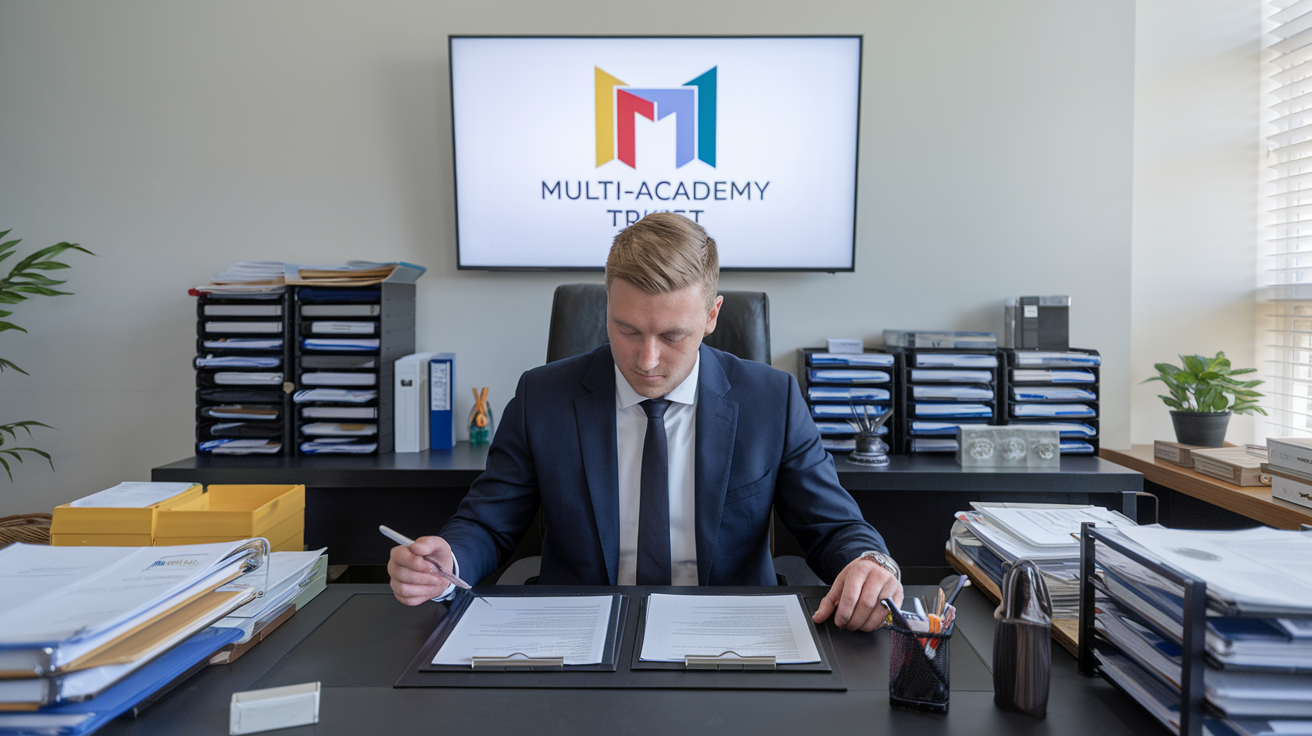Imagine you’re a school leader, juggling countless responsibilities while trying to secure the best resources for your students. Now, multiply that challenge across multiple schools within a Multi-Academy Trust (MAT). Overwhelming, isn’t it? 🏫📚
In the complex world of education procurement, MATs face a unique set of challenges. From navigating intricate tendering processes to ensuring compliance with ever-changing regulations, the task can seem Herculean. But what if there was a way to turn this daunting process into a strategic advantage? Enter procurement experts: the unsung heroes who can transform your MAT’s tendering approach from a necessary evil into a powerful tool for success.
In this blog post, we’ll explore why partnering with procurement specialists is not just a smart move, but a game-changer for MATs. We’ll delve into how these experts can help you overcome procurement hurdles, maximise cost savings, and ensure compliance. We’ll also examine the innovative technologies they bring to the table and how they can enhance the quality and performance of your trust’s operations. So, buckle up as we embark on a journey to unlock the full potential of your MAT’s procurement processes! 🚀💼
Understanding Multi-Academy Trusts’ Procurement Challenges

Complex purchasing needs across multiple schools
Multi-Academy Trusts (MATs) face a unique challenge in managing diverse procurement requirements across their network of schools. Each institution within the trust may have distinct needs, ranging from educational materials to specialised equipment.
- Varied curriculum requirements
- Different age groups and learning needs
- Specialised facilities (e.g., science labs, sports equipment)
- ICT infrastructure and software
This complexity is further compounded by the need to standardise processes whilst accommodating individual school preferences.
Limited in-house expertise
Many MATs struggle with a shortage of dedicated procurement professionals within their organisation. This gap in expertise can lead to:
- Inefficient purchasing decisions
- Missed opportunities for bulk purchasing discounts
- Inadequate supplier vetting and management
| Challenges of Limited Expertise | Potential Consequences |
|---|---|
| Lack of market knowledge | Overpaying for goods/services |
| Poor negotiation skills | Unfavourable contract terms |
| Insufficient tender preparation | Lower-quality bids received |
Regulatory compliance requirements
MATs must navigate a complex landscape of regulations governing public sector procurement. Key compliance areas include:
- EU procurement thresholds
- Public Contracts Regulations 2015
- Department for Education guidelines
- Equality Act 2010 considerations
Failure to adhere to these regulations can result in legal challenges, financial penalties, and reputational damage.
Budget constraints and value for money
With increasing pressure on education budgets, MATs must demonstrate value for money in all procurement activities. This involves:
- Balancing cost-effectiveness with quality
- Considering whole-life costs of purchases
- Identifying opportunities for shared services across schools
Achieving this balance whilst meeting the diverse needs of multiple schools requires strategic planning and expert guidance.
The Role of Procurement Experts in Tendering

Specialised knowledge and experience
Procurement experts bring a wealth of specialised knowledge and experience to Multi-Academy Trusts (MATs), significantly enhancing their tendering processes. These professionals possess in-depth understanding of:
- Education sector procurement regulations
- Best practices in tender preparation and evaluation
- Contract management and supplier performance metrics
Their expertise allows MATs to navigate complex procurement landscapes efficiently, ensuring compliance and maximising value for money.
Strategic approach to sourcing
A strategic approach to sourcing is crucial for MATs to achieve optimal outcomes. Procurement experts employ:
- Needs assessment and market analysis
- Supplier qualification and evaluation
- Risk assessment and mitigation strategies
- Long-term cost-benefit analysis
This structured approach leads to more informed decision-making and better alignment with the MAT’s overall objectives.
| Traditional Approach | Strategic Approach |
|---|---|
| Short-term focus | Long-term planning |
| Price-driven | Value-driven |
| Limited supplier pool | Diverse suppliers |
| Reactive procurement | Proactive strategy |
Negotiation skills
Procurement experts excel in negotiation, a critical skill for securing favourable terms and conditions. They:
- Employ data-driven negotiation tactics
- Understand supplier motivations and leverage points
- Balance cost savings with quality and service requirements
- Secure win-win outcomes for both MATs and suppliers
Market insights and supplier relationships
With their finger on the pulse of the education procurement market, experts provide invaluable insights to MATs. They:
- Monitor market trends and pricing fluctuations
- Identify emerging suppliers and innovative solutions
- Leverage existing relationships for preferential terms
- Foster collaborative partnerships with key suppliers
These market insights enable MATs to make informed decisions and stay ahead of the curve in an ever-evolving procurement landscape.
Maximising Cost Savings and Efficiency

Bulk purchasing power
Multi-Academy Trusts (MATs) can significantly benefit from the collective buying power that comes with scale. By consolidating procurement across multiple schools, MATs can negotiate better deals and secure more favourable terms from suppliers. This approach not only reduces costs but also ensures consistency in quality and service across the trust.
| Benefits of Bulk Purchasing | Examples |
|---|---|
| Lower unit costs | Up to 30% savings on stationery |
| Volume discounts | Bulk IT equipment purchases |
| Improved supplier relationships | Dedicated account managers |
| Standardised quality | Consistent teaching materials |
Streamlined procurement processes
Implementing standardised procurement processes across all schools within a MAT can lead to significant time and resource savings. By adopting best practices and centralising key procurement functions, trusts can:
- Reduce duplication of effort
- Implement consistent evaluation criteria
- Establish a centralised supplier database
- Develop standardised contract templates
Reduced administrative burden
Centralising procurement activities can alleviate the administrative load on individual schools, allowing them to focus on their core educational mission. This approach:
- Frees up staff time for teaching and learning
- Minimises paperwork and bureaucracy
- Ensures compliance with procurement regulations
- Provides expert support for complex purchases
Identification of cost-saving opportunities
Procurement experts can analyse spending patterns across the MAT to identify areas for potential savings. By leveraging data and market intelligence, they can:
- Conduct spend analysis to identify high-impact categories
- Benchmark prices against market rates
- Identify opportunities for demand management
- Explore alternative products or services that offer better value
With these strategies in place, MATs can achieve significant cost savings and improve overall procurement efficiency, ultimately benefiting the entire trust and its stakeholders.
Ensuring Compliance and Risk Management

Up-to-date knowledge of procurement regulations
Procurement experts play a crucial role in ensuring Multi-Academy Trusts (MATs) remain compliant with the latest regulations. Their in-depth understanding of the ever-changing landscape of procurement laws is invaluable for MATs navigating complex tendering processes.
- Key regulations experts stay abreast of:
- Public Contracts Regulations 2015
- EU procurement directives
- Department for Education guidelines
- Academies Financial Handbook
Due diligence in supplier selection
Thorough vetting of potential suppliers is essential to mitigate risks associated with procurement. Procurement experts employ robust due diligence processes to evaluate suppliers’ financial stability, track record, and capacity to deliver.
| Due Diligence Criteria | Importance |
|---|---|
| Financial health | High |
| Past performance | Critical |
| Compliance history | Essential |
| Capacity to deliver | Crucial |
Contract management expertise
Effective contract management is vital for MATs to ensure suppliers meet their obligations and deliver value for money. Procurement experts bring specialised skills in:
- Drafting watertight contracts
- Negotiating favourable terms
- Monitoring supplier performance
- Managing contract variations and disputes
Mitigation of legal and financial risks
By leveraging their expertise, procurement specialists help MATs identify and mitigate potential risks throughout the tender process. This proactive approach safeguards trusts against legal challenges and financial losses, ensuring a smooth and compliant procurement journey.
Leveraging Technology and Innovation

E-procurement solutions
E-procurement solutions have revolutionised the way Multi-Academy Trusts (MATs) manage their purchasing processes. These digital platforms streamline procurement activities, offering numerous benefits:
- Centralised supplier management
- Automated purchase order creation
- Real-time spend visibility
- Improved supplier collaboration
By implementing e-procurement solutions, MATs can significantly reduce administrative burdens and improve overall efficiency. Here’s a comparison of traditional vs e-procurement methods:
| Traditional Procurement | E-Procurement |
|---|---|
| Manual paperwork | Digital documentation |
| Time-consuming processes | Streamlined workflows |
| Limited visibility | Real-time tracking |
| Prone to errors | Improved accuracy |
| Siloed information | Centralised data |
Data-driven decision making
Harnessing the power of data analytics enables MATs to make more informed procurement decisions. By analysing historical spending patterns, supplier performance, and market trends, procurement experts can:
- Identify cost-saving opportunities
- Negotiate better contracts
- Forecast future needs accurately
- Benchmark performance against industry standards
Automation of routine tasks
Implementing automation in procurement processes can free up valuable time for MAT staff to focus on strategic activities. Some key areas where automation can be applied include:
- Invoice processing
- Contract renewal reminders
- Spend analysis reporting
- Supplier onboarding
By leveraging these technological advancements, MATs can enhance their procurement capabilities and achieve better outcomes. Next, we’ll explore how procurement experts can help MATs enhance quality and performance in their tendering processes.
Enhancing Quality and Performance

Supplier performance management
Effective supplier performance management is crucial for Multi-Academy Trusts (MATs) to ensure high-quality goods and services. Procurement experts can implement robust systems to:
- Monitor supplier performance
- Conduct regular supplier evaluations
- Address issues promptly
- Foster collaborative relationships
| Key Performance Indicator | Measurement Method | Target |
|---|---|---|
| On-time delivery | % of deliveries on schedule | 98% |
| Quality of goods/services | Defect rate or customer satisfaction | <2% defects or >90% satisfaction |
| Cost savings | % reduction in costs over time | 5% annual reduction |
| Responsiveness | Average response time to queries | <24 hours |
Continuous improvement strategies
Procurement experts can help MATs implement continuous improvement strategies to enhance quality and performance:
- Regular supplier feedback sessions
- Joint innovation workshops
- Lean procurement processes
- Value engineering initiatives
- Supplier development programmes
These strategies not only improve the quality of goods and services but also drive innovation and efficiency across the trust’s procurement activities.
Benchmarking against industry standards
To ensure MATs are achieving the best possible outcomes, procurement experts can:
- Conduct regular benchmarking exercises
- Compare performance against other trusts and industry standards
- Identify areas for improvement
- Set realistic yet ambitious targets
By leveraging industry best practices and standards, MATs can significantly enhance their procurement performance and deliver better value for money. This approach also helps in identifying innovative solutions and emerging trends in education procurement.
Building Long-term Procurement Capabilities

Knowledge transfer to in-house teams
Building long-term procurement capabilities within Multi-Academy Trusts (MATs) begins with effective knowledge transfer to in-house teams. Procurement experts play a crucial role in this process, sharing their expertise and best practices with MAT staff. This transfer of knowledge typically involves:
- On-the-job training sessions
- Workshops and seminars
- Mentoring programmes
- Collaborative project work
By engaging in these activities, MAT staff can develop a deeper understanding of procurement processes, strategies, and technologies. This knowledge empowers them to make informed decisions and handle routine procurement tasks independently.
| Benefits of Knowledge Transfer | Impact on MATs |
|---|---|
| Increased staff competence | Improved decision-making |
| Reduced reliance on external experts | Cost savings |
| Enhanced internal communication | Streamlined processes |
| Continuous improvement culture | Long-term efficiency |
Development of procurement strategies
With a solid foundation of knowledge, MATs can work alongside procurement experts to develop tailored procurement strategies. These strategies should align with the trust’s overall objectives and address specific challenges faced by educational institutions. Key elements of effective procurement strategies include:
- Spend analysis and categorisation
- Supplier relationship management
- Risk assessment and mitigation plans
- Sustainable procurement practices
- Performance metrics and KPIs
Creation of best practice guidelines
To ensure consistency and maintain high standards in procurement processes, MATs should collaborate with experts to create comprehensive best practice guidelines. These guidelines serve as a reference for all staff involved in procurement activities and typically cover:
- Ethical considerations in supplier selection
- Standardised tender evaluation criteria
- Contract management protocols
- Compliance with relevant regulations
- Continuous improvement mechanisms
By implementing these guidelines, MATs can establish a robust procurement framework that promotes efficiency, transparency, and value for money across all their academies.

Multi-Academy Trusts face unique procurement challenges that require specialised expertise to navigate effectively. By utilising procurement experts for tendering, MATs can overcome these hurdles and achieve significant benefits. From maximising cost savings and efficiency to ensuring compliance and risk management, these professionals bring invaluable knowledge and experience to the table. Furthermore, they can help MATs leverage cutting-edge technology and innovative solutions, ultimately enhancing the quality and performance of their procurement processes.
Investing in procurement expertise is not just a short-term solution; it’s a strategic move that builds long-term capabilities within the organisation. By partnering with procurement experts, Multi-Academy Trusts can develop robust, sustainable procurement practices that drive success and deliver value for years to come. As the education landscape continues to evolve, embracing professional procurement support will be crucial for MATs looking to thrive in an increasingly competitive environment.








